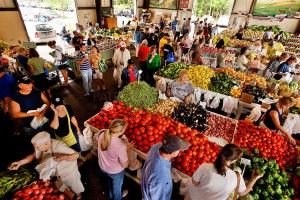By Cathie Broocks
Director of Admissions, Charlotte Christian School

“You are what you eat” is an expression often used in the world of adult nutrition. Today, that expression could be updated to say, “Your child’s brain functions best, when fed best.” The linkage between nutrition and academic success (or lack of success) is a hot topic among researchers focused on brain-based learning.
Statistics are startling:
– 1 in 6 children in the United States is obese (some studies suggest as many as 1 in 3).
– Children obese by age 4 can suffer IQ losses up to 15-18 points. Obese children are also prone to suffer sleep apnea and asthma, each affecting school performance.
– 1 in 6 children suffer from a disability that affects their behavior, memory or ability to learn. Diagnoses of ADHD are up 250% since 1990. Many researchers link these issues with too many processed foods and too few essential nutrients.
On the opposite end of this spectrum is research supporting a multitude of positive outcomes for families who prepare and eat dinner together. In a 20 year study the National Merit Scholarship Corporation evaluated contributing elements in students’ achievements. “To their surprise the students came from families who ate together three or more nights a week.” Researchers at Washington State University found that preschoolers developed better language skills and experienced enhanced linguistic development when they ate dinner with their family. An eight year Harvard University study found similar results. This study concluded that family dinners contributed more to healthy child development than any other adult-involved activity.
The challenge for today’s busy parents is to find ways to establish both healthy eating habits and healthy eating times, together! The good news is – small changes can lay a foundation for larger results, with positive health and academic outcomes. All research underscores the powerful impact of parents’ guidance and participation in nutritional selections. Moreover, a family with joint goals experiences joint joys.
Listed below are seven first steps to improving your child’s nutritional palette while nurturing optimal brain development:
1. Commit to eating breakfast. The brain is the only organ that cannot store energy. Concentration, energy levels and motor coordination are affected by breakfast (or the lack of). The best breakfasts contain protein and complex carbohydrates. Think outside the cereal box, to fun alternatives – fruit smoothies, cheese pizza, fruit and trail mix. The summer months provide a wonderful time to experiment with new recipes and develop a ready set of favorites by the start of school.
2. Research shows that children make better food selections when they know an adult is overseeing their choices. Equally impactful, children are more prone to eat what they have cooked, even if the item is new to them. The Science Chef, by Joan D’Amico and Karen Drummond offers simple science experiments and recipes, with minimal ingredients. Even dads could be coaxed into the kitchen with The Everything Kids’ Gross Cookbook by Colleen Sell and Melinda Frank. Mailbox Magazine has a Look-n-Cook book which promotes pre-reading skills through sequential, pictorial illustrations.
3. While most parents acknowledge the need to avoid many sugary drinks, they may not know that artificial sweeteners have been linked to hyperactivity and diarrhea in children. Water remains, as Dr. Naomi Neufild a pediatric endocrinologist reports, an overlooked food for children. The average kindergartener needs 4-5 glasses of water a day. Dehydration can interfere with the body’s abilities to transport nutrients to the brain. The resulting lethargy, poor concentration and headaches impact school success. Carrying a water bottle at all times is an important habit for both children and adults to establish.
4. Organic foods offer 30% higher content of antioxidants (reference, the Center for Eco Literacy). NaturallySavvy.com provides ‘The Clean 15’, foods low in pesticides and which can be purchased as non-organic. These are mangoes, asparagus, eggplant, cantaloupe, grapefruit, kiwi, avocados, peas (frozen), pineapple, sweet potatoes, watermelon, honeydew melons, sweet corn (frozen) and onions. Foods worth buying organic are celery, strawberries, nectarines, blueberries, cherries, peaches, apples, spinach, kale and imported grapes.
5. The type of fat a child eats affects the composition of the brain as well as eye development. The right kinds of fats enable children to think, to store and to retrieve memories. Good sources of Omega-3 are tuna, salmon, trout, walnuts, pumpkin seeds, eggs and soybeans. Walnuts, sesame seeds, and sunflower seeds provide riches in Omega-6.
6. Studies show that a child will not eat better than the adults around him. Making proper food selections and a willingness to try new dishes should begin with parents. Most parents give up too early when trying introducing new foods. Offer 1-2 tablespoons and be prepared to present the ‘opportunity to try’ a new food 10-20 times. Avoid power plays or bribes, just continue to present.
7. Sustained nutritional learning is best served as a family activity. Visit farmers’ markets and explore u-pick-it farms in neighboring counties (visit www.ncfarmfresh.com/farmmarkets.asp to learn about farms near you). Consider planting a small herb or vegetable garden and/or starting a backyard compost heap. Garden Wizardry for Kids by Patricia Kite provides growing ideas for fruits and vegetables, indoor plant experiments and easy plant craft projects. Your enthusiasm will be contagious and the good nutritional choices developed by the family will provide brain blessings for years to come.
Feed your brain through exploration of the following websites:
– www.foodforthebrain.org (recipes, lunch box ideas, games, research)
– www.brainpop.com/health/nutrition (research and activities focused on nutrition)
– www.fruitandveggiesmorematters.org (sets of healthy menus, with grocery lists, 12 page guide – Take your Child to the Supermarket)
Happy Eating!
You can find Cathie Broocks and Charlotte Christian at:
Click here for a full overview of Charlotte Christian.
Charlotte Christian Open House
Thursday, January 30, 2014 at 7:00 pm
Grades JK-12 Open House
Charlotte Christian School
7301 Sardis Road
Charlotte, NC 28270
(704) 366-5657
facebook
twitter: @charchristiannc



